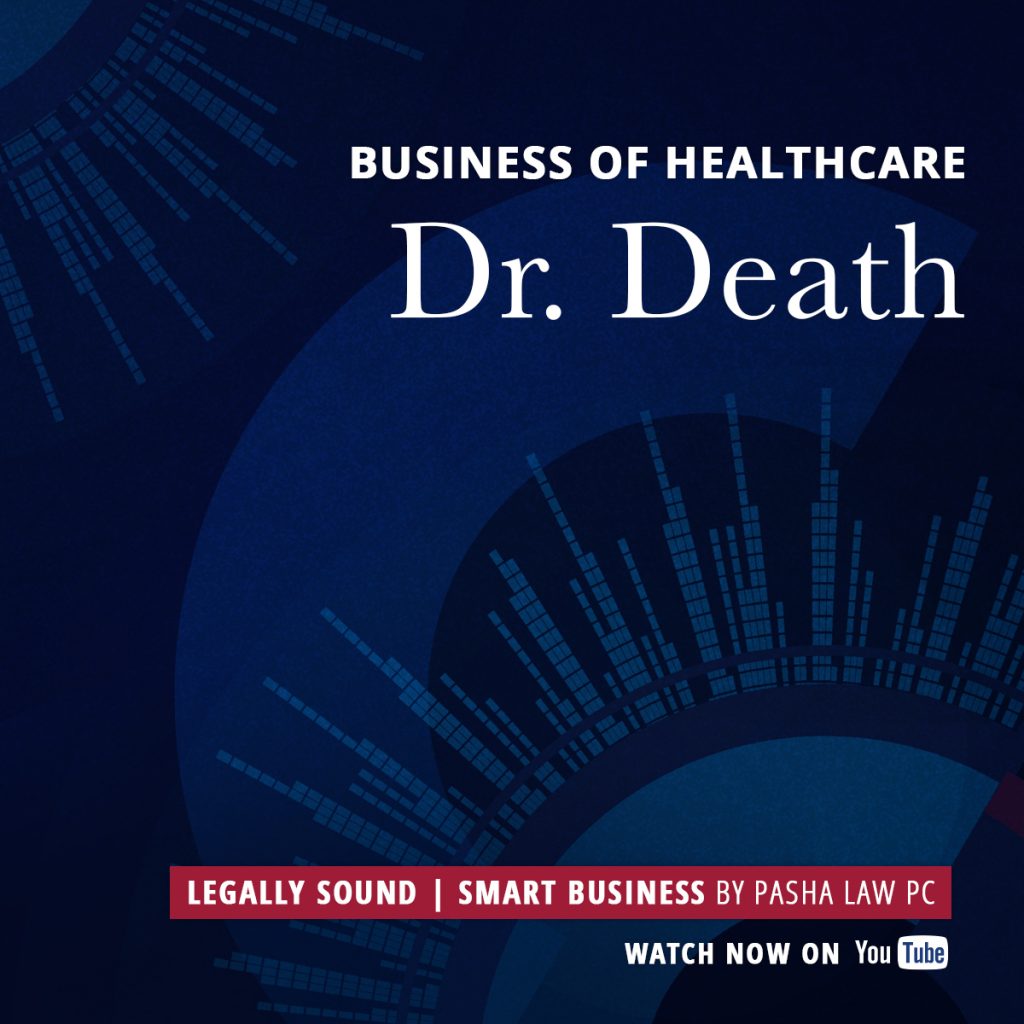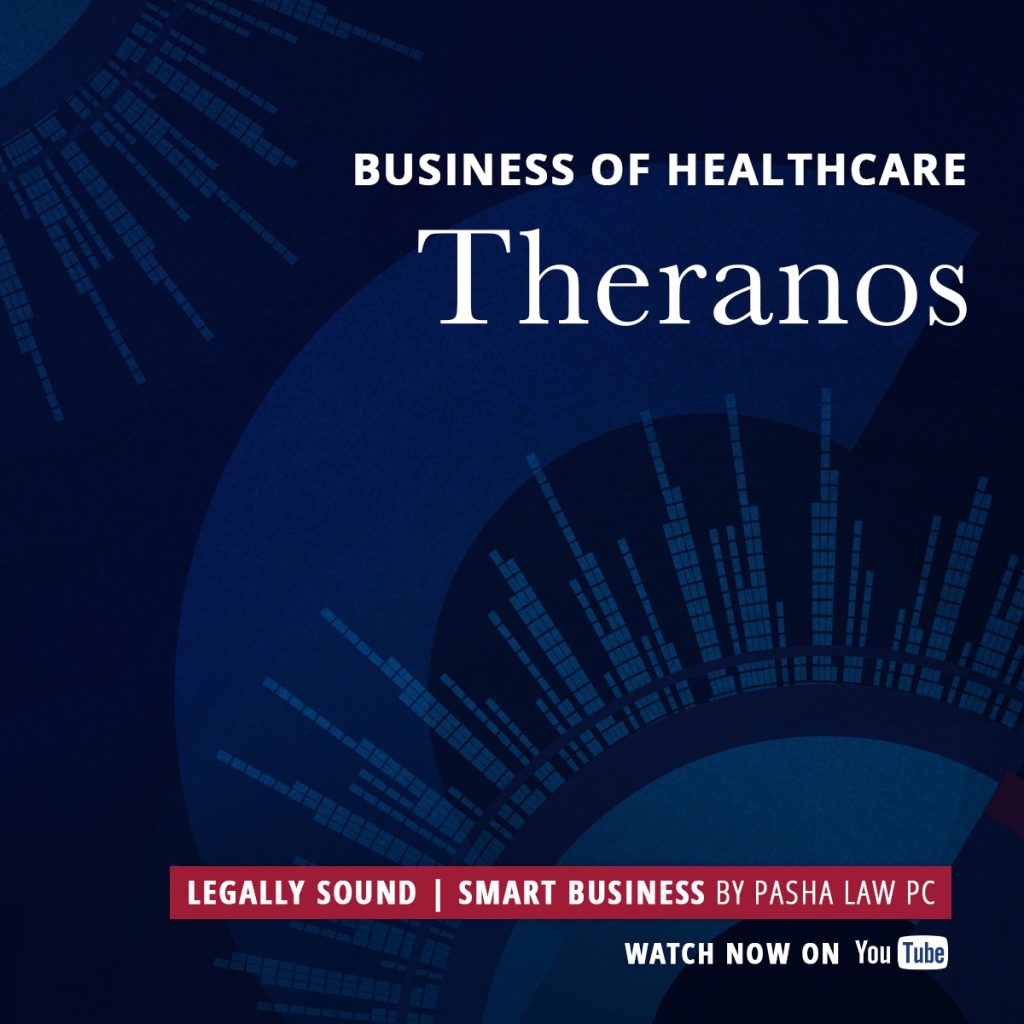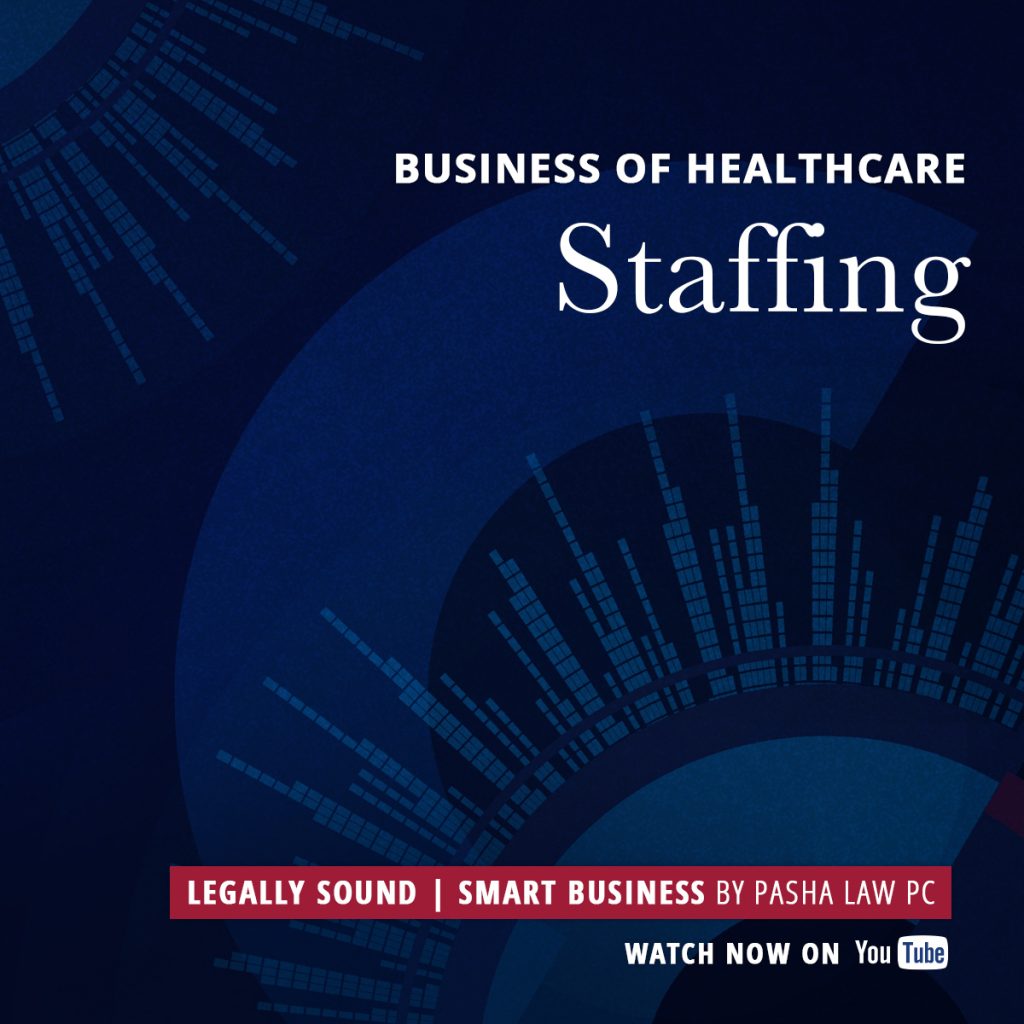In most industries, client referrals are a normal course of business. However, in the healthcare industry, patient referrals are scrutinized especially if the referrer is compensated or if the referrer receives some kind of benefit from the referral. The federal Stark Law and Anti-Kickback Statutes generally applies to Medicare, Medicaid, and other federal healthcare programs. These laws are designed to discourage and punish compensation schemes that would amount to fraud and abuse of Medicaid and Medicare claims. The central intent of the two statutes is to protect federal healthcare program beneficiaries by preventing and punishing fraud and abuse, such as over utilization of medical services, increased costs, poor-quality medical services, and unfair competition.
Stark Law:
The federal Physician Self-Referral Law, often referred to as the Stark Law, was enacted by Congress in 1989 with the intent of prohibiting physicians from referring Medicare patients to clinical labs where the physician, or family member of the physician, would have a financial relationship, such as an direct or indirect ownership or investment interest in an entity or a direct or indirect compensation arrangement with an entity. The Stark Law is a strict liability statute, meaning that even if a physician or entity did not intend to violate the Stark Law, the physician or entity would generally be held accountable. Penalties for violating the Stark Law could include denial of payment, refund of payment in an amount three times the amount of improper payment, civil monetary penalty of $15,000 per service, and civil monetary penalty of $100,000 for each arrangement that is considered to be a circumvention scheme. Generally, the Stark Law functions to do three things:
- Prohibits physicians from referring Medicare patients to entities that provided specific designated health services (DHS) if the physician or an immediate family member of the physician had a financial relationship with the entity, unless an exception applies;
- Prohibits the entity from billing Medicare or causing Medicare to be billed for the referred services (such as through a third party); and
- Establishes certain exceptions that allow Physicians to enter into specific arrangements, and grants the Secretary the authority to issue advisory opinions for financial relationships that do not pose a risk of Medicare or patient abuse.
One of the more difficult concepts to understand about the Stark Law is that its defined terms are exceptionally wide-ranging. Immediate family members are defined broadly as including spouses, birth or adoptive parents, children, or siblings, stepparents, stepchildren, daughters-in-law, sons-in-law, brothers-in-law, sisters-in-law, grandparents or grandchildren, and spouses of a grandparent or grandchild. The definition of financial relationship includes not only different types of ownership or investment interests, but also encompasses a wide range of compensation arrangements.
Even more confusingly, the definition of referral does not only consist of physician referrals but includes ordering designated health services or certifying the need for designated health services for which payment may be made. Essentially, if a physician makes a prohibited referral under the Stark Law, the entity may not submit a claim for reimbursement for the services provided to Medicare or other federal health care programs. However, it is generally understood that physicians who personally perform the DHS they order for their patients can structure referral arrangements without worrying about potential Stark violations, but those arrangements must be still be scrutinized under both the Stark Law and Anti-Kickback Statute. The following items or services are defined as Designated Health Services (DHS):
- Clinical laboratory services
- Physical therapy services
- Occupational therapy services
- Outpatient speech-language pathology services
- Radiology and certain other imaging services
- Radiation therapy services and supplies
- Durable medical equipment and supplies
- Parenteral and enteral nutrients, equipment, and supplies
- Prosthetics, orthotics, and prosthetic devices and supplies
- Home health services
- Outpatient prescription drugs
- Inpatient and outpatient hospital services
Stark Exceptions:
Generally, all of the exceptions to the Stark Law must comply with the regulations of the Centers of Medicare & Medicaid Services (CMS) and Stark, comply with the Anti-Kickback statute, and will only apply if the amount and volume of the referrals are not excessive. This can be difficult to navigate as each statute and each exception have very specific requirements. Something physicians and medical practices should be wary of is entering into arrangements where compensation is based on the value or volume of the physician’s referrals, as this is the basis of many Stark Law investigations. Physicians and entities should be aware that any referral arrangement that fits into one of the Stark Law exceptions must follow all of the requirements within the exception, which can be more difficult and confusing than it seems. Usually, an arrangement between a physician and an entity should be recorded as a written and signed agreement, for a term of one year, between the parties. The exceptions to the Stark Law typically fall into three categories based on the financial relationship the physician has with the referred entity. It should be noted that although an arrangement may appear to fall into a certain exception, it may not be strictly limited to that particular category or exception.
- Exceptions to both compensation and ownership or investment arrangements
- Physician Services
- In-Office Ancillary Services
- Services Furnished by an Organization to Enrollees
- Academic Medical Centers
- Implants Furnished by an Ambulatory Surgical Center (ASC)
- Eyeglasses and Contact Lenses After a Patient has Cataract Surgery
- EPO (Erythropoietin) and Other Prescription Drugs for Dialysis Patients who need Outpatient Treatment
- Preventative Services (Vaccines, Immunizations, etc.)
- Intra-Family Rural Referrals
- Exception to only ownership or investment arrangements
- Interest in Publicly Traded Securities (such as at the New York Stock Exchange)
- Interest in Mutual Funds covered by the IRS
- Interest in Certain Providers (such as rural providers)
- Exceptions to only compensation arrangements
- Rental of Office Space
- Equipment Rental
- Bona Fide Employee Relationship
- Personal Service Arrangement (i.e. Independent Contractors)
- Doctor Incentive Plan
- Physician Recruitment
- Charitable Contributions
- Nonmonetary Compensation
- Fair Market Value Compensation
- Medical Staff Incidental Benefits
- Risk-sharing Arrangements
- Compliance Training
- Indirect Compensation Arrangements
- Obstetrical Malpractice Insurance Subsidies
- Professional Courtesy
- Retention Payments in Underserved Areas
- Community-wide Health Information Systems
- Electronic Prescribing Items and Services
- Electronic Health Records Items and Services
- Assistance to Compensate a Non-Physician Practitioner
- Timeshare Arrangements
Anti-Kickback Statute:
Congress enacted the Anti-Kickback Statute in 1972 as part of the Social Security Amendments of 1972. It is widely known that the Anti-Kickback Statute prohibits any person or business from offering, solicitating, or accepting any kind of gift or remuneration in exchange for referrals of business reimbursable by a federal healthcare program. Unlike the Stark Law that was limited to DHS where a physician’s, or family member of the physician, has a financial interest, the Anti-Kickback Statute applies to any items or services. The Anti-kickback Statutes is broader than the Stark Law because it can apply to physicians, healthcare entities, and third parties, even if they are not a healthcare entity. Renumeration is defined as anything of value, which may implicate a wide range of payments including discounts, gifts, or, even, items given for free.
The federal Anti-Kickback Statute is a criminal statute. As such, normally, a violation of the Anti-Kickback Statute requires proof of improper intent to induce referrals. In other words, the Anti-Kickback Statute is violated when something of value is knowingly and willingly provided for the purpose of inducing referrals. The possible consequences of violating the Anti-Kickback Statute includes criminal penalties of a fine up to $25,000, a five-year prison term per kickback violation, and exclusion from Medicare, Medicaid, and other federal plans and programs. In addition, the civil penalties for violating the Anti-Kickback Statute can cost as much as $50,000 per kickback and three times the amount of damages sustained by the government. The penalties for Anti-Kickback violations can be imposed on both parties—the party receiving the kickback and on the party giving the kickback.
Anti-Kickback Exceptions:
Safe Harbor regulations were created to allow some payment and business practices to continue, even if they appear to violate the Anti-Kickback Statute. Usually the parties in question must meet the precise requirements of the Safe Harbor in order to be protected from prosecution or sanctions. Ordinarily, if a business arrangement does not fit squarely into a Safe Harbor, the arrangement must be assessed for Anti-Kickback compliance through an Office of the Inspector General (OIG) or U.S. Department of Health and Human Services regulation. Like the Stark Law, if a physician, health care entity, or third-party entity chooses to enter into a business arrangement, the parties must ensure that they are in full compliance with the requirements of whichever Safe Harbor they use. The Safe Harbors are wide ranging and can be complicated to interpret. A non-exclusive list of Safe Harbor exceptions are as follows:
- Investment Interests
- Space Rental
- Equipment Rental
- Personal Services and Management Contracts
- Sale of Practice
- Referral Services
- Warranties
- Discounts
- Employees
- Group Purchasing Organizations
- Waiver of Beneficiary Co-payment
- Increased Coverage, Reduced Cost-Sharing Amounts, or Reduced Premium Amounts
- Price Reductions Offered to Health Plans
- Practitioner Recruitment
- Obstetrical Malpractice Insurance Subsidies
- Cooperative Hospital Service Organizations
- Ambulatory Surgical Centers
- Referral Arrangements for Specialty Services
- Price Reductions Offered to Eligible Managed Care Organizations
- Price Reductions Offered by Contractors with Substantial Financial Risk to Managed Care Organizations
- Ambulance Replenishing
- Health Centers
- Electronic Prescribing Items and Services
- Electronic Health Records Items and Services
- Federally Qualified Health Centers and Medicare Advantage Organizations
- Medicare Coverage Gap Discount Program
- Local Transportation
Conclusion:
Both the Stark Law and Anti-Kickback Statue arose out of congressional concern of renumeration provided for referrals. In particular, congress wanted to protect the integrity of the Medicare and Medicaid programs and prevent medically unnecessary treatments that were harmful to vulnerable populations. Both laws were strengthened and modified over time since their enactment to ensure that the intent of the statutes, and the healthcare provided, continues to meet the needs of Medicare and Medicaid recipients. Several government agencies are involved with the enforcement of the Stark Law and Anti-Kickback Statute including the Department of Justice, Department of Health and Human Services, and the Centers for Medicaid and Medicare. The False Claims Act is sometimes used to deter and redress healthcare fraud violations under the Stark Law and Anti-Kickback Statutes. In addition, the False Claims Act protects federal healthcare programs from claims that are false or fraudulent. The fact that a claim results from a kickback or is made in violation of the Stark law may render it false or fraudulent, and may result in liability under the False Claims Act, Anti-Kickback Statute, and/or Stark law.






![Business of Healthcare [e316]](https://www.pashalaw.com/wp-content/uploads/2021/11/Pasha_LSSB_BusinessofHealthcare_banner-1024x723.jpg)




![Law in the Digital Age: Exploring the Legal Intricacies of Artificial Intelligence [e323]](https://www.pashalaw.com/wp-content/uploads/2023/11/WhatsApp-Image-2023-11-21-at-13.24.49_4a326c9e-300x212.jpg)
![Unraveling the Workforce: Navigating the Aftermath of Mass Layoffs [e322]](https://www.pashalaw.com/wp-content/uploads/2023/07/Untitled-design-23-300x212.png)
![Return to the Office vs. Remote: What Can Employers Legally Enforce? [e321]](https://www.pashalaw.com/wp-content/uploads/2023/01/Pasha_LSSB_321_banner-300x212.jpg)
![Explaining the Hans Niemann Chess Lawsuit v. Magnus Carlsen [e320]](https://www.pashalaw.com/wp-content/uploads/2022/10/LAWYER-EXPLAINS-7-300x169.png)
![California v. Texas: Which is Better for Business? [313]](https://www.pashalaw.com/wp-content/uploads/2021/07/Pasha_LSSB_CaliforniaVSTexas-300x212.jpg)
![Buyers vs. Sellers: Negotiating Mergers & Acquisitions [e319]](https://www.pashalaw.com/wp-content/uploads/2022/06/Pasha_LSSB_BuyersVsSellers_banner-300x212.jpg)
![Employers vs. Employees: When Are Employment Restrictions Fair? [e318]](https://www.pashalaw.com/wp-content/uploads/2022/05/Pasha_LSSB_EmployeesVsEmployers_banner-1-300x212.jpg)
![Vaccine Mandates Supreme Court Rulings [E317]](https://www.pashalaw.com/wp-content/uploads/2022/02/WhatsApp-Image-2022-02-11-at-4.10.32-PM-300x212.jpeg)
![Business of Healthcare [e316]](https://www.pashalaw.com/wp-content/uploads/2021/11/Pasha_LSSB_BusinessofHealthcare_banner-300x212.jpg)
![Social Media and the Law [e315]](https://www.pashalaw.com/wp-content/uploads/2021/10/WhatsApp-Image-2021-10-06-at-1.43.08-PM-300x212.jpeg)
![Defining NDA Boundaries: When does it go too far? [e314]](https://www.pashalaw.com/wp-content/uploads/2021/09/Pasha_LSSB_NDA_WordPress-2-300x212.jpg)
![More Than a Mistake: Business Blunders to Avoid [312] Top Five Business Blunders](https://www.pashalaw.com/wp-content/uploads/2021/06/Pasha_LSSB_Blunders_WP-1-300x212.jpg)
![Is There a Right Way to Fire an Employee? We Ask the Experts [311]](https://www.pashalaw.com/wp-content/uploads/2021/02/Pasha_LSSB_FireAnEmployee_Website-300x200.jpg)
![The New Frontier: Navigating Business Law During a Pandemic [310]](https://www.pashalaw.com/wp-content/uploads/2020/12/Pasha_LSSB_Epidsode308_Covid_Web-1-300x200.jpg)
![Wrap Up | Behind the Buy [8/8] [309]](https://www.pashalaw.com/wp-content/uploads/2020/11/Pasha_BehindTheBuy_Episode8-300x200.jpg)
![Is it all over? | Behind the Buy [7/8] [308]](https://www.pashalaw.com/wp-content/uploads/2020/09/iStock-1153248856-overlay-scaled-300x200.jpg)
![Fight for Your [Trademark] Rights | Behind the Buy [6/8] [307]](https://www.pashalaw.com/wp-content/uploads/2020/07/Fight-for-your-trademark-right-300x200.jpg)
![They Let It Slip | Behind the Buy [5/8] [306]](https://www.pashalaw.com/wp-content/uploads/2020/06/Behind-the-buy-they-let-it-slip-300x200.jpg)
![Mo’ Investigation Mo’ Problems | Behind the Buy [4/8] [305]](https://www.pashalaw.com/wp-content/uploads/2020/05/interrobang-1-scaled-300x200.jpg)
![Broker or Joker | Behind the Buy [3/8] [304] Behind the buy - Broker or Joker](https://www.pashalaw.com/wp-content/uploads/2020/04/Joker-or-Broker-1-300x185.jpg)
![Intentions Are Nothing Without a Signature | Behind the Buy [2/8] [303]](https://www.pashalaw.com/wp-content/uploads/2020/04/intentions-are-nothing-without-a-signature-300x185.jpg)
![From First Steps to Final Signatures | Behind the Buy [1/8] [302]](https://www.pashalaw.com/wp-content/uploads/2020/04/first-steps-to-final-signatures-300x185.jpg)
![The Dark-side of GrubHub’s (and others’) Relationship with Restaurants [e301]](https://www.pashalaw.com/wp-content/uploads/2015/04/When-Competition-Goes-Too-Far-Ice-Cream-Truck-Edition-300x201.jpg)
![Ultimate Legal Breakdown of Internet Law & the Subscription Business Model [e300]](https://www.pashalaw.com/wp-content/uploads/2019/05/Ultimate-Legal-Breakdown-of-Internet-Law-the-Subscription-Business-Model-300x196.jpg)
![Why the Business Buying Process is Like a Wedding?: A Legal Guide [e299]](https://www.pashalaw.com/wp-content/uploads/2019/03/futura-300x169.jpg)
![Will Crowdfunding and General Solicitation Change How Companies Raise Capital? [e298]](https://www.pashalaw.com/wp-content/uploads/2018/11/Will-Crowdfunding-and-General-Solicitation-Change-How-Companies-Raise-Capital-300x159.jpg)
![Pirates, Pilots, and Passwords: Flight Sim Labs Navigates Legal Issues (w/ Marc Hoag as Guest) [e297]](https://www.pashalaw.com/wp-content/uploads/2018/07/flight-sim-labs-300x159.jpg)
![Facebook, Zuckerberg, and the Data Privacy Dilemma [e296] User data, data breach photo by Pete Souza)](https://www.pashalaw.com/wp-content/uploads/2018/04/data-300x159.jpg)
![What To Do When Your Business Is Raided By ICE [e295] I.C.E Raids business](https://www.pashalaw.com/wp-content/uploads/2018/02/ice-cover-300x159.jpg)
![General Contractors & Subcontractors in California – What you need to know [e294]](https://www.pashalaw.com/wp-content/uploads/2018/01/iStock-666960952-300x200.jpg)
![Mattress Giants v. Sleepoplis: The War On Getting You To Bed [e293]](https://www.pashalaw.com/wp-content/uploads/2017/12/sleepopolis-300x159.jpg)
![The Harassment Watershed [e292]](https://www.pashalaw.com/wp-content/uploads/2017/12/me-2-300x219.jpg)
![Investing and Immigrating to the United States: The EB-5 Green Card [e291]](https://www.pashalaw.com/wp-content/uploads/2012/12/eb-5-investment-visa-program-300x159.jpg)
![Responding to a Government Requests (Inquiries, Warrants, etc.) [e290] How to respond to government requests, inquiries, warrants and investigation](https://www.pashalaw.com/wp-content/uploads/2017/10/iStock_57303576_LARGE-300x200.jpg)
![Ultimate Legal Breakdown: Employee Dress Codes [e289]](https://www.pashalaw.com/wp-content/uploads/2017/08/Ultimate-Legal-Breakdown-Template-1-300x159.jpg)
![Ultimate Legal Breakdown: Negative Online Reviews [e288]](https://www.pashalaw.com/wp-content/uploads/2017/06/Ultimate-Legal-Breakdown-Online-Reviews-1-300x159.jpg)
![Ultimate Legal Breakdown: Social Media Marketing [e287]](https://www.pashalaw.com/wp-content/uploads/2017/06/ultimate-legal-breakdown-social-media-marketing-blur-300x159.jpg)
![Ultimate Legal Breakdown: Subscription Box Businesses [e286]](https://www.pashalaw.com/wp-content/uploads/2017/03/ultimate-legal-breakdown-subscription-box-services-pasha-law-2-300x159.jpg)
![Can Companies Protect Against Foreseeable Misuse of Apps [e285]](https://www.pashalaw.com/wp-content/uploads/2017/01/iStock-505291242-300x176.jpg)
![When Using Celebrity Deaths for Brand Promotion Crosses the Line [e284]](https://www.pashalaw.com/wp-content/uploads/2017/01/celbrity-300x159.png)
![Are Employers Liable When Employees Are Accused of Racism? [e283] Racist Employee](https://www.pashalaw.com/wp-content/uploads/2016/12/Are-employers-liable-when-an-employees-are-accused-of-racism-300x159.jpg)
![How Businesses Should Handle Unpaid Bills from Clients [e282] What to do when a client won't pay.](https://www.pashalaw.com/wp-content/uploads/2016/12/How-Businesses-Should-Handle-Unpaid-Bills-to-Clients-300x159.png)
![Can Employers Implement English Only Policies Without Discriminating? [e281]](https://www.pashalaw.com/wp-content/uploads/2016/11/Can-Employers-Impliment-English-Only-Policies-Without-Discriminating-300x159.jpg)
![Why You May No Longer See Actors’ Ages on Their IMDB Page [e280]](https://www.pashalaw.com/wp-content/uploads/2016/10/IMDB-AGE2-300x159.jpg)
![Airbnb’s Discrimination Problem and How Businesses Can Relate [e279]](https://www.pashalaw.com/wp-content/uploads/2016/09/airbnb-300x159.jpg)
![What To Do When Your Amazon Account Gets Suspended [e278]](https://www.pashalaw.com/wp-content/uploads/2016/09/What-To-Do-When-Your-Amazon-Account-Gets-Suspended-1-300x200.jpg)
![How Independent Artists Reacted to Fashion Mogul Zara’s Alleged Infringement [e277]](https://www.pashalaw.com/wp-content/uploads/2016/08/How-Independent-Artists-Reacted-to-Fashion-Mogul-Zaras-Alleged-Infringement--300x159.jpg)
![Can Brave’s Ad Replacing Software Defeat Newspapers and Copyright Law? [e276]](https://www.pashalaw.com/wp-content/uploads/2016/08/Can-Braves-Ad-Replacing-Software-Defeat-Newspapers-and-Copyright-Law-300x159.jpg)
![Why The Roger Ailes Sexual Harassment Lawsuit Is Far From Normal [e275]](https://www.pashalaw.com/wp-content/uploads/2016/07/WHY-THE-ROGER-AILES-SEXUAL-HARASSMENT-LAWSUIT-IS-FAR-FROM-NORMAL-300x159.jpeg)
![How Starbucks Turned Coveted Employer to Employee Complaints [e274]](https://www.pashalaw.com/wp-content/uploads/2016/07/iStock_54169990_LARGE-300x210.jpg)
